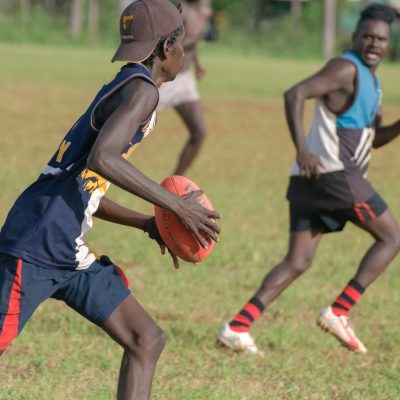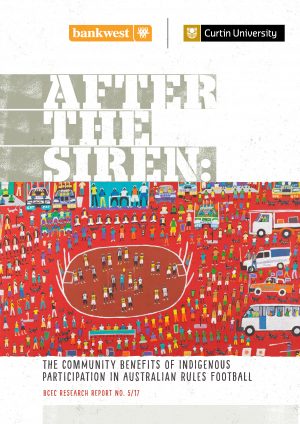Benefits of footy go beyond physical health: new research

Joanne Peckitt, Communication and Stakeholder Engagement Coordinator
— Indigenous adult AFL players are twice as likely to rate their health as excellent —
— Socio-economic status not a factor for children playing AFL —
— Number of women’s football teams has doubled since AFL Women’s League introduced —
Indigenous adults who play football are healthier, happier and better connected, a new Bankwest Curtin Economics Centre report on Indigenous participation in AFL released today shows.
The Bankwest Curtin Economics Centre’s (BCEC’s) latest report, After the Siren: The community benefits of Indigenous participation in Australian Rules Football, examines the physical health, mental wellbeing and community connectedness benefits that flow from playing football.
BCEC Principal Research Fellow and report author Associate Professor Mike Dockery said the report reveals the benefits of playing AFL extend beyond physical health benefits, highlighting the positive mental health and community level outcomes.
“Of significance is both the high rates of young Indigenous men participating in AFL – reaching up to 65 per cent in remote areas across Australia – and the positive impact this has on mental health, even after controlling for a range of factors, including age, remoteness, socio-economic, labour force and marital status,” Associate Professor Dockery said.
“This finding is particularly important given the high rates of psychological stress and incarceration experienced by Indigenous men. The incarceration rate for Indigenous juveniles is 24 times that of non-Indigenous youth. AFL has an important role to play in fostering mental health and positively engaging disaffected youth.”
The report highlights the role of AFL in bringing people from all sectors of the community together, including Indigenous, refugee and migrant groups, in a safe space of mutual respect.
Associate Professor Dockery said footy was a vital part of life in remote Indigenous communities in WA and central Australia, including the Northern Territory and northern South Australia, where football carnivals and festivals bring different family groups together.
“Football offers opportunities to strengthen and pass on kinship networks, and for men and women to gather separately to talk about issues,” Associate Professor Dockery said.
“It’s not just players, it’s umpires, bus drivers, cooks, administrators, friends, family – football brings the whole community together.
“We found playing football led to better school attendance for Indigenous boys in remote areas. Football clubs and carnivals are being used to deliver road safety and anti-domestic violence programs, to conduct health checks, and vehicle safety and seat-belt checks.”
The report identifies considerable potential for deriving benefits from greater investment in structured AFL competitions and other sports programs in remote areas.
“Given the strong evidence of the benefits of AFL for Indigenous children and youth, along with their love of footy and the well-known issues facing many remote communities, we were surprised to find a number of remote centres had no junior football competition,” Associate Professor Dockery said.
“We recommend all tiers of government and local education, health, employment and justice agencies work together with the AFL to get a footy competition up and running in these communities, possibly by coordinating funding for a sports development officer.”
Report co-author and Senior Research Fellow, Dr Sean Gorman from Curtin University’s School of Media, Culture and Creative Arts, said the report also found that AFL is an inclusive sport that offers wide accessibility irrespective of socio-economic background.
“While children from disadvantaged backgrounds were less likely to participate in other organised sport, this was less apparent for AFL,” Dr Gorman said.
The report also assesses the likely impact of the AFL Women’s League in promoting the sport among young women.
“Although the AFL Women’s League is still in its infancy, the WA Football Commission has reported almost a doubling in the number of female football teams in WA, since the League began,” Dr Gorman said.
“The positive social and community level impacts are likely to commence with today’s players, but the longer-term health benefits in the form of positive self-esteem and identity for Indigenous girls and women will flow over years to come.”
Key findings from the report include:
Participation in AFL and sport
- 46.6 per cent of Aboriginal and Torres Strait Islander children reported playing sport in the past 12 months.
- AFL is the second-most popular team sport among Aboriginal and Torres Strait Islanders with almost 45,000 Indigenous players.
- One in four Indigenous men in Western Australia play AFL, second only to the Northern Territory at 31.2 per cent.
- Almost 50 per cent of Indigenous males aged four to 19, living in the AFL States, participate in AFL.
- More than 65 per cent of young men aged between 15 and 29 living in remote areas of Australia played AFL.
- Children of families who own their home are around 20 percentage points more likely to have participated in sport.
- Having no car in the household is estimated to increase the probability of choosing AFL as a sport by 15 percentage points.
- Boys from sole-parent families are substantially less likely to choose football as their organised sport.
- Football and Indigenous culture are complementary: children and adults who identify with a tribal or language group are more likely to play AFL.
- Being married with children increases the likelihood of men playing AFL relative to other sports by 13 percentage points, compared to being single without children.
- For Indigenous people who experienced discrimination in the past 12 months, women are around three percentage points more likely to have played organised sport and men are five percentage points more likely to have played either general sports or AFL.
- Men who experienced unfair treatment in the past year were 12 percentage points more likely to have played AFL than other organised sports.
- Among Indigenous men, 27 per cent participated in some code of football.
The benefits of participation in AFL and sport
- 56 per cent of Aboriginal and Torres Strait Islander children who participated in football were assessed as being in excellent health compared to 48 per cent of those who had not participated in any organised sport.
- Parents expressed health concerns for 22.9 per cent of children playing AFL, compared to 26.7 per cent for non-sporting participants.
- Children who played football were six percentage points less likely to be assessed as having learning difficulties due to health issues.
- Boys living in remote areas playing AFL had a 20 per cent lower truancy incidence.
- Indigenous adults who played football in the previous 12 months reported higher life satisfaction than people who did not participate in sport.
- Those adults playing AFL were twice as likely as those playing no sport to rate their health as excellent.
- Mental health is estimated to be higher among Indigenous men and women who participate in organised sport, after controlling for an extensive range of other factors.





